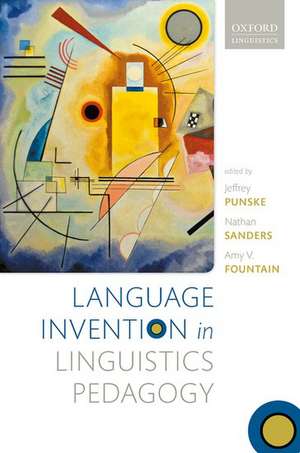Language Invention in Linguistics Pedagogy
Editat de Jeffrey Punske, Nathan Sanders, Amy V. Fountainen Limba Engleză Paperback – 12 aug 2020
| Toate formatele și edițiile | Preț | Express |
|---|---|---|
| Paperback (1) | 231.54 lei 3-5 săpt. | +20.05 lei 4-10 zile |
| OUP OXFORD – 12 aug 2020 | 231.54 lei 3-5 săpt. | +20.05 lei 4-10 zile |
| Hardback (1) | 589.33 lei 10-16 zile | |
| OUP OXFORD – 12 aug 2020 | 589.33 lei 10-16 zile |
Preț: 231.54 lei
Nou
Puncte Express: 347
Preț estimativ în valută:
44.31€ • 46.09$ • 36.58£
44.31€ • 46.09$ • 36.58£
Carte disponibilă
Livrare economică 24 martie-07 aprilie
Livrare express 07-13 martie pentru 30.04 lei
Preluare comenzi: 021 569.72.76
Specificații
ISBN-13: 9780198829881
ISBN-10: 0198829884
Pagini: 336
Dimensiuni: 162 x 234 x 18 mm
Greutate: 0.52 kg
Editura: OUP OXFORD
Colecția OUP Oxford
Locul publicării:Oxford, United Kingdom
ISBN-10: 0198829884
Pagini: 336
Dimensiuni: 162 x 234 x 18 mm
Greutate: 0.52 kg
Editura: OUP OXFORD
Colecția OUP Oxford
Locul publicării:Oxford, United Kingdom
Recenzii
Students can unfold their creativity while at the same time learning about phonetics, phonology, morphology, syntax, semantics, pragmatics, and other areas of linguistics.
This book is ideal for students of applied linguistics, sociolinguistics, historical linguistics, and language acquisition, in addition to teachers, and researchers wishing to learn about invented languages. Overall, this book is a valuable source that provides frameworks for understanding the use of language invention in linguistics pedagogy. Researchers can consult this volume for directions of current constructed language research and readers do not need to have any familiarity with conlangs before reading the book.
Linguists consider their object of study as part of the natural world. But language is also something we can create. The contributions in this book show how an emphasis on the artificial rather than the natural can help create enthusiasm about linguistics and insight into language, among school children and university students alike.
This lively volume from well-respected conlangers, teachers, and linguists convincingly makes the case that invented languages can be used as a creative pedagogical tool to introduce students to linguistics. The chapters argue that conlanging in the classroom will allow us to reach a broader student population and better train budding linguists.
This book is ideal for students of applied linguistics, sociolinguistics, historical linguistics, and language acquisition, in addition to teachers, and researchers wishing to learn about invented languages. Overall, this book is a valuable source that provides frameworks for understanding the use of language invention in linguistics pedagogy. Researchers can consult this volume for directions of current constructed language research and readers do not need to have any familiarity with conlangs before reading the book.
Linguists consider their object of study as part of the natural world. But language is also something we can create. The contributions in this book show how an emphasis on the artificial rather than the natural can help create enthusiasm about linguistics and insight into language, among school children and university students alike.
This lively volume from well-respected conlangers, teachers, and linguists convincingly makes the case that invented languages can be used as a creative pedagogical tool to introduce students to linguistics. The chapters argue that conlanging in the classroom will allow us to reach a broader student population and better train budding linguists.
Notă biografică
Jeffrey Punske is Assistant Professor in the Department of Linguistics at Southern Illinois University. His primary research focus is in morphosyntax with a secondary specialization in linguistics pedagogy and outreach. He has presented on issues of language at workshops hosted by the European Space Agency and METI and works to cross disciplinary boundaries and to advance the methodologies and discourses around linguistic pedagogy and outreach.Nathan Sanders is Assistant Professor, Teaching Stream, at the Department of Linguistics, University of Toronto. He works on innovations in linguistics pedagogy and on addressing equity, diversity, and inclusion in the linguistics classroom. His linguistic research centers on biomechanics and perception, for both speech and sign languages. He also works on phonological theory, computational and statistical models of linguistic phenomena, language change, and linguistic typology.Amy V. Fountain is Associate Professor, Career Track, in the Department of Linguistics at the University of Arizona. She has taught introductory linguistics and a range of other courses at the University of Arizona since 2004. Her research focuses on language reclamation, revitalization, and endangerment, particularly with reference to Native American languages; she is also interested in prosodic phonology and the relationship between morphology and phonology.
